White polished concrete countertops are becoming a popular choice among homeowners and designers alike, thanks to their modern aesthetic, durability, and versatility. These countertops provide a sleek, clean look that can complement various kitchen styles, from industrial to minimalist. Made from a mixture of cement, aggregates, and water, polished concrete countertops are not only beautiful but also highly functional. Their smooth, reflective surface adds an elegant touch to any kitchen while offering a practical, easy-to-maintain workspace.
The process of creating a white polished concrete countertop involves several steps. First, a mold is constructed to the desired shape and size of the countertop. The concrete mixture, often including white cement or pigments to achieve the white color, is then poured into the mold. After the concrete sets and cures, it is removed from the mold and polished to achieve a smooth, glossy finish. Polishing involves grinding the surface with progressively finer abrasive pads until the desired level of sheen is reached. This process not only enhances the appearance of the concrete but also increases its density and durability.
One of the main advantages of white polished concrete countertops is their durability. Concrete is a robust material that can withstand heavy use, making it ideal for kitchen countertops. When properly sealed, polished concrete is resistant to stains, scratches, and heat. This makes it a practical choice for busy kitchens where spills, hot pots, and sharp utensils are common. Additionally, the polishing process creates a dense surface that is less likely to harbor bacteria and mold, contributing to a healthier kitchen environment.
Another benefit of white polished concrete countertops is their versatility in design. Concrete can be molded into any shape, allowing for customized designs that fit perfectly in any kitchen layout. Whether you want a large island countertop with integrated sinks or a seamless countertop that flows into a backsplash, concrete can be tailored to your specific needs. Furthermore, the color and finish of the concrete can be customized. Pigments can be added to achieve different shades of white, and various polishing techniques can create finishes ranging from matte to high gloss.

The aesthetic appeal of white polished concrete countertops is undeniable. Their clean, minimalist look makes them a popular choice for contemporary and modern kitchens. The reflective surface of polished concrete can help brighten a kitchen by reflecting light, making the space feel larger and more open. The neutral white color also provides a versatile backdrop that can complement a wide range of cabinet colors and kitchen accessories. Whether paired with natural wood cabinets for a warm, inviting look or sleek, black cabinets for a striking contrast, white polished concrete countertops add a touch of sophistication to any kitchen.
Maintaining white polished concrete countertops is relatively straightforward. To keep the surface looking its best, it should be regularly cleaned with a mild, pH-neutral cleaner and a soft cloth or sponge. Avoid using abrasive cleaners or scrubbing pads, as they can damage the polished surface. It is also important to reapply a sealer periodically, as this will help protect the concrete from stains and moisture. A well-sealed countertop will repel liquids, making it easier to clean up spills and preventing substances from penetrating the surface and causing stains.
While polished concrete countertops are durable, they are not indestructible. To prevent damage, it is recommended to use cutting boards when preparing food and trivets or hot pads for hot pots and pans. Heavy or sharp objects should not be dropped on the countertop, as this can cause chips or cracks. If damage does occur, it can often be repaired by a professional. Minor scratches can be buffed out, and small chips can be filled with a matching concrete patch.

The environmental impact of concrete countertops is a consideration for many homeowners. Concrete is made from natural materials, and when locally sourced, it can have a lower carbon footprint compared to other countertop materials. Additionally, the longevity and durability of concrete countertops mean they do not need to be replaced as often as other materials, reducing waste. However, the production of cement, a key component of concrete, is energy-intensive and produces a significant amount of carbon dioxide. Choosing a concrete countertop manufacturer that uses environmentally friendly practices can help mitigate this impact.
The cost of white polished concrete countertops can vary widely depending on factors such as the size and complexity of the countertop, the type of concrete used, and the level of customization. On average, concrete countertops can be more expensive than laminate or tile countertops but less expensive than natural stone options like granite or marble. The investment in concrete countertops can be justified by their durability, longevity, and unique aesthetic appeal.
For those who enjoy DIY projects, creating a concrete countertop can be a rewarding endeavor. There are many resources available, including instructional videos and guides, that can help you through the process. However, it is important to note that working with concrete requires skill and patience. Mistakes can be costly, and achieving a high-quality finish can be challenging for beginners. For the best results, it is often recommended to hire a professional with experience in concrete countertop fabrication.
White polished concrete countertops can be paired with various kitchen elements to create a cohesive design. For a rustic or industrial look, consider pairing the countertops with exposed brick walls or metal accents. For a more modern or minimalist design, pair them with sleek, flat-panel cabinets and stainless steel appliances. The versatility of concrete allows it to blend seamlessly with different design elements, making it a versatile choice for any kitchen style.

In addition to kitchens, white polished concrete countertops can be used in bathrooms, outdoor kitchens, and even commercial settings. Their durability and customizability make them suitable for a wide range of applications. In bathrooms, a concrete vanity top can add a contemporary touch, while in outdoor kitchens, the weather-resistant properties of concrete make it an ideal choice. In commercial settings, concrete countertops can withstand heavy use and provide a stylish, durable surface for bars, restaurants, and retail spaces.
The unique look of polished concrete countertops can also be enhanced with various decorative elements. Embedded materials such as glass, stones, or metal can create interesting patterns and textures. Integral sinks, drainboards, and trivets can be incorporated into the countertop design for a seamless, custom look. These decorative touches allow for endless design possibilities, ensuring that your concrete countertop is truly one-of-a-kind.
While concrete countertops are often associated with modern and contemporary designs, they can also be adapted to more traditional styles. For example, a white polished concrete countertop with a softer, matte finish can provide a subtle, understated look that complements traditional cabinetry and classic kitchen designs. The ability to customize the color and finish of concrete makes it a versatile option that can be tailored to suit a variety of design preferences.
One of the key factors in the popularity of white polished concrete countertops is their ability to combine form and function. They provide a stylish, modern look while offering practical benefits such as durability, heat resistance, and easy maintenance. This combination of aesthetic appeal and functionality makes concrete countertops an attractive option for homeowners and designers looking for a high-performance, low-maintenance countertop material.
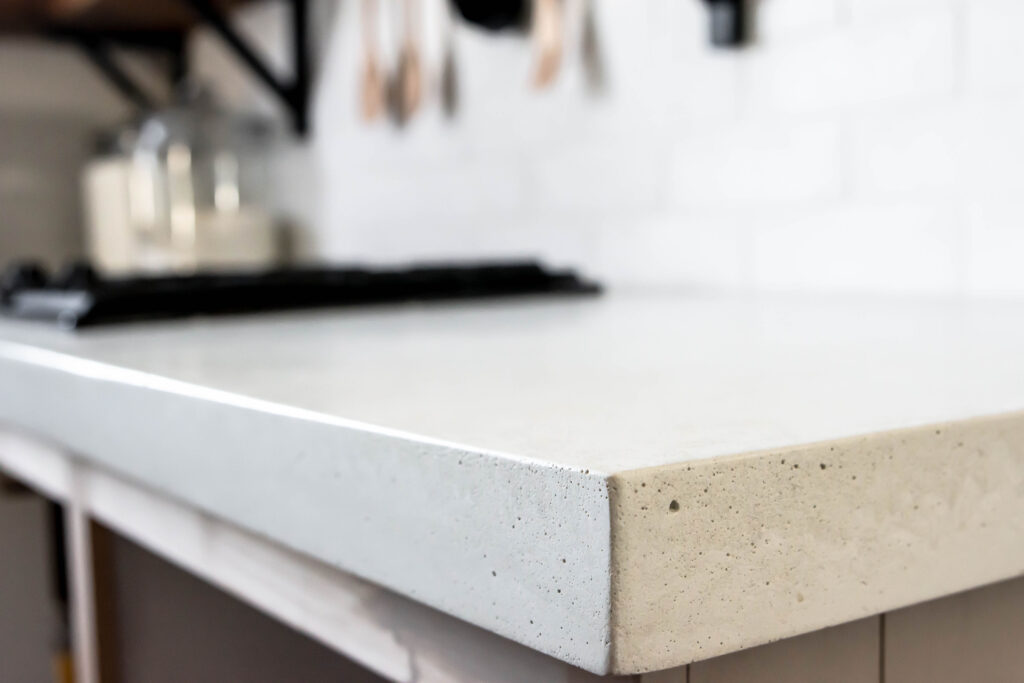
Common Mistakes to Avoid:
Improper Sealing: Failing to properly seal the countertop can lead to staining and damage. It’s essential to use a high-quality sealer and reapply it periodically to maintain protection.
Using Harsh Cleaners: Abrasive or acidic cleaners can damage the polished surface. Always use a mild, pH-neutral cleaner to avoid etching or dulling the finish.
Ignoring Regular Maintenance: Neglecting regular cleaning and maintenance can result in a buildup of grime and potential damage. Consistent upkeep is necessary to keep the countertop looking its best.
Inadequate Support: Concrete countertops are heavy and require proper support to prevent sagging or cracking. Ensure that your cabinets and supports are strong enough to bear the weight.
Improper Mixing: Incorrectly mixing the concrete or adding too much water can weaken the countertop, making it more susceptible to cracks and damage. Follow the manufacturer’s instructions closely.
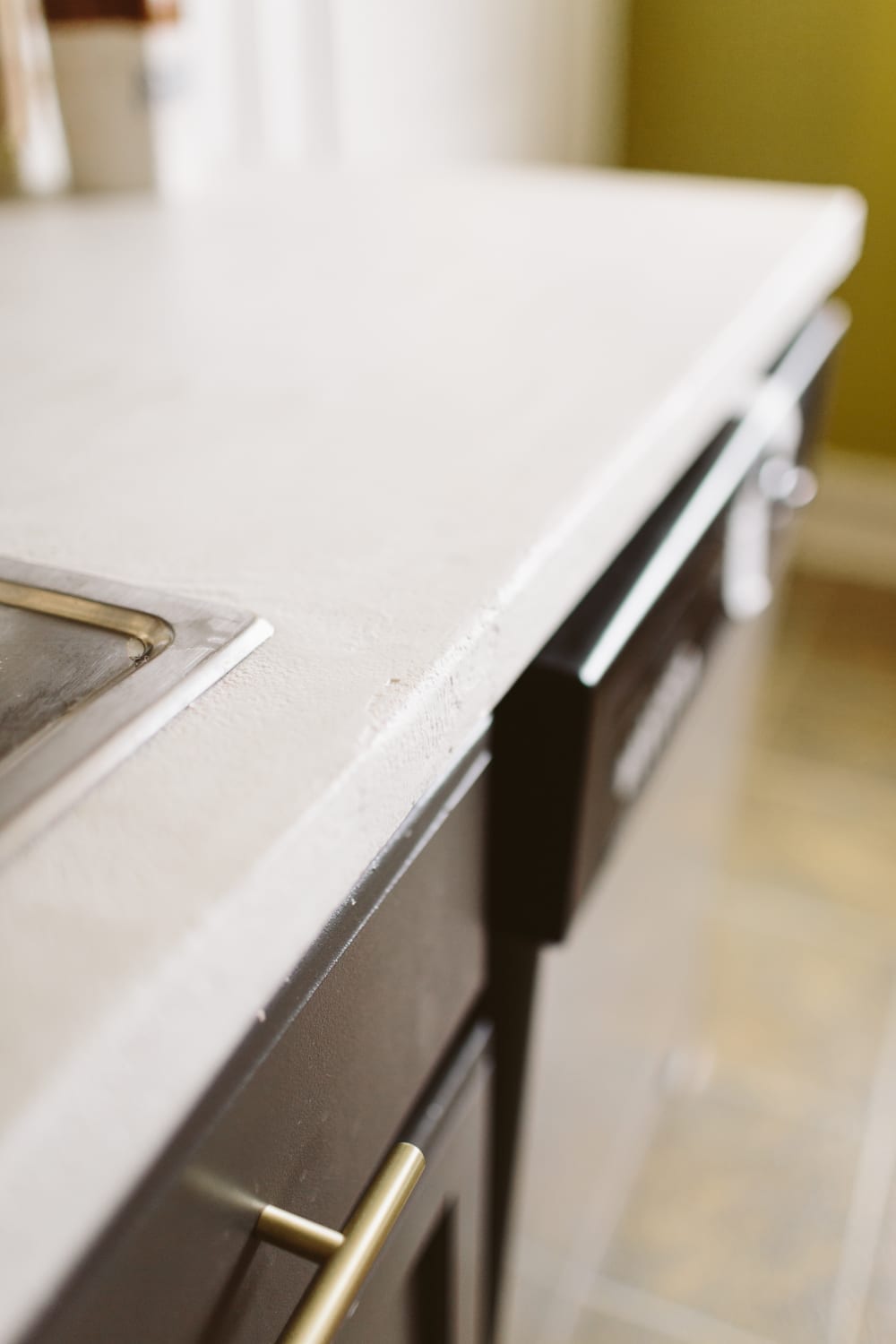
Overloading with Weight: While concrete is durable, placing excessively heavy objects on the countertop can cause stress and potential damage. Distribute weight evenly and use supports for heavy items.
DIY without Experience: Attempting to create a concrete countertop without proper experience or knowledge can result in costly mistakes. Consider hiring a professional to ensure a high-quality finish.
Neglecting Temperature Changes: Concrete can expand and contract with temperature changes. Avoid placing hot pots directly on the surface and use trivets or hot pads to prevent thermal shock.
Inconsistent Coloring: Achieving a consistent white color can be challenging. Use high-quality pigments and follow proper mixing techniques to ensure an even color throughout the countertop.
Failing to Plan for Plumbing and Fixtures: Ensure that all necessary plumbing and fixtures are considered during the planning and mold-making stages. Adjustments after the concrete has cured can be difficult.
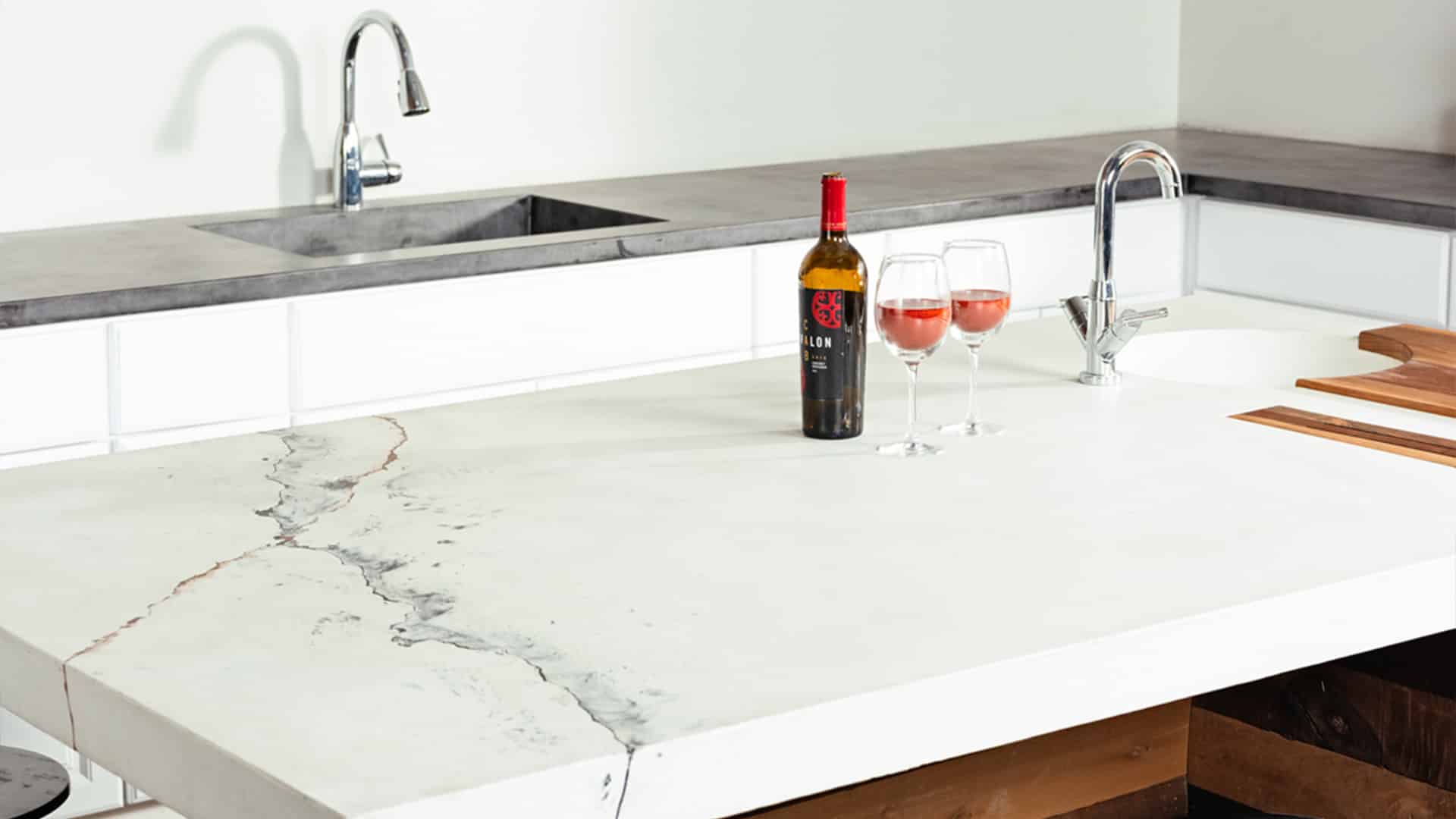
How do I clean and maintain my white polished concrete countertop?
Regular cleaning with a mild, pH-neutral cleaner and a soft cloth is essential for maintaining the appearance of your polished concrete countertop. Avoid using abrasive or acidic cleaners, as they can damage the polished surface. It’s also important to periodically reapply a high-quality sealer to protect the countertop from stains and moisture. For daily cleaning, a simple mixture of warm water and a few drops of dish soap works well. Gently wipe the surface with a soft cloth or sponge, then dry it thoroughly to prevent water spots.
Can I place hot pots directly on my concrete countertop?
While concrete is heat-resistant, it is not immune to thermal shock, which can cause cracking or discoloration. It’s advisable to use trivets or hot pads when placing hot pots and pans on your concrete countertop. Direct exposure to high heat can compromise the integrity of the sealer and potentially damage the concrete. Using a trivet or hot pad will help protect the surface and extend the lifespan of your countertop.
What should I do if my concrete countertop gets stained?
If a stain occurs, it’s important to address it as quickly as possible. For organic stains like coffee or wine, a poultice made from baking soda and water can be effective. Apply the paste to the stain, cover it with plastic wrap, and let it sit for several hours or overnight before wiping it away. For more stubborn stains, a professional may need to be consulted. Regular sealing can prevent most stains by creating a barrier that repels liquids.

How long do polished concrete countertops last?
With proper care and maintenance, polished concrete countertops can last many years, even decades. Their durability makes them a long-term investment for your kitchen. The key to longevity is regular maintenance, including cleaning, sealing, and protecting the surface from excessive heat and sharp objects. By following these guidelines, you can ensure that your concrete countertop remains in excellent condition for many years.
Are polished concrete countertops environmentally friendly?
Concrete countertops can be environmentally friendly, especially if they are made with locally sourced materials and eco-friendly practices. The longevity and durability of concrete also contribute to its sustainability, as it reduces the need for frequent replacements. However, the production of cement is energy-intensive and produces significant carbon emissions. To make a more environmentally conscious choice, look for manufacturers that prioritize sustainable practices and use recycled materials.
Can I repair chips or cracks in my concrete countertop?
Minor chips and cracks can often be repaired using a concrete patching compound that matches the color of your countertop. For best results, it’s advisable to hire a professional to perform the repair, as they have the expertise to blend the patch seamlessly with the existing surface. Regular sealing and proper care can help prevent chips and cracks, but if they do occur, prompt repair will ensure the longevity and appearance of your countertop.

Concrete Countertops – Pros, Cons, DIY & Care
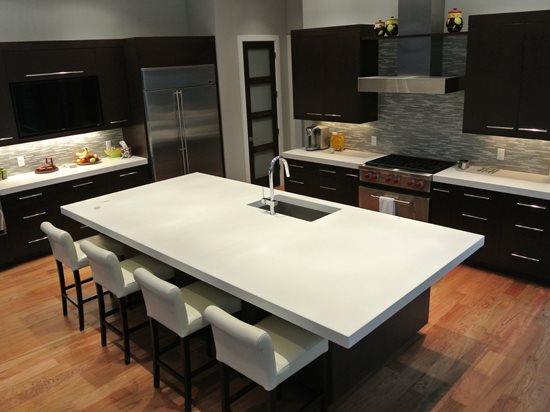
White Concrete Kitchen Countertops
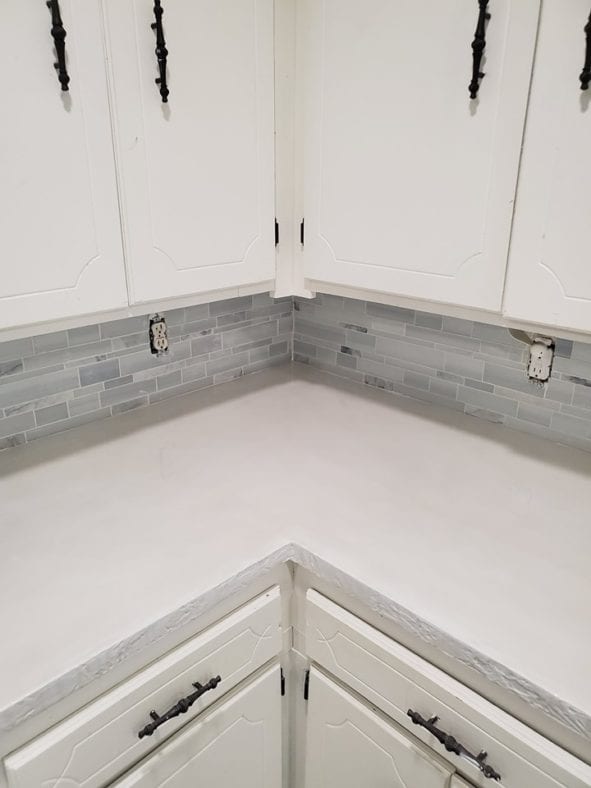
Related articles:
- Concrete Countertop Overlay
- Black Concrete Countertops
- Marble Look Concrete Countertops
- Light Grey Concrete Countertops
- Concrete Countertop Design Ideas
- Light Colored Concrete Countertops
- Epoxy On Concrete Countertop
- Concrete Countertops Designs
- Concrete Countertops That Look Like Wood
- White Concrete Countertops